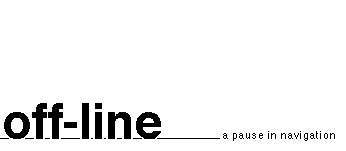One day in December, while reading an article published
by Puntonet in Argentina,
I discovered that the European Union had declared year 2000
“the year of the internet”. I felt a bit guilty for
my ignorance. But hardly anyone else had noticed. That isn’t
surprising. It’s been happening for the last six or seven
years. Someone says that it’s going to be “the year of
the internet”, then everyone forgets and a year later it
starts all over. Does that make sense? I don’t think so. The
internet isn’t an event for a single year. It’s been around
for over twenty years and it’s here to stay. In one way or
another, it will continue to grow.
When European commissioner Erkki Liikanen commented on
the year, he pointed to two facts. The number of internet
users in Europe is growing. We knew that, and it isn’t a new
or temporary trend. E–commerce isn’t taking off. We knew that
as well; the interesting fact is that European authorities
are beginning to notice (though they don’t seem to have any
clear ideas about what should be done).
The remarkable thing about year 2000 is that nothing new
happened. The net continues to grow, but that isn’t new.
Every other day someone announces a “revolutionary
innovation” that has no effect (or generates a certain
amount of unnecessary confusion). Often
“innovations” are old ideas painted over to make
them appear new. In the never-ending onslaught of pseudo
innovations it’s hard to tell which (new or old) things may
be useful and which will just pile up in the already huge
dump of the clumsy and useless manipulations.
We need to understand that the internet isn’t a
“revolution”. Revolutions are short-lived. In a few
years they fail – or turn into something very different from
what their initiators had in mind.
There was one exception in history. The American revolution of 1774-76.
But it wasn’t a revolution: it was an independence war.
The internet is evolution. It’s almost universally agreed
in theory (but hardly understood in practice) that it’s a
biological system. That doesn’t mean that
it’s slow. Evolution can be fast or slow depending on
circumstances, seasons, weather, its own phases, the environment, etc.
Now that we are moving into something called “year
one”... maybe it’s the time to re-consider. We should
put an end to “short
term” thinking. We should stop behaving like that
peculiar insect, the mayfly (ephemera), that flies and mates and dies in
a few hours. It’s true that some “ephemeral”
ventures made a few people very rich. That’s not new. In
every stage of turbulent change there have always been people
who managed to “take the money and run”. Good for
them. But in the history books, fifty years from now, there
will be no trace of their adventures – except maybe in some
footnotes about the peculiarities and growing pains of the
net’s childhood or adolescence.
We don’t need to go back to the drawing board. The
blueprint is there, from the very beginning. The real
internet is alive and growing. Not in the shadow, but a bit
removed from the limelight. We just need to look behind some
useless props and remove a lot of crumbling superstructures
that are hiding its real nature.
Happy “year one” to all. Let’s hope that it
will bring us something really new and interesting. With less
confusing haste, less aimless “navigation”... and a
little more time to think.
On the growth of the internet worldwide and in Europe
(and on usage patterns in Italy) there are analyses in the
data section of this site. Unfortunately
they are only in Italian; but it’s fairly easy to understand
charts and graphs, regardless of language.



